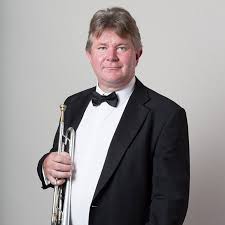Mote Hall, Maidstone, 19 March 2016
In his introduction Brian Wright noted that the concert was book-ended by Adagios. While this was technically true the difference between the two could hardly have been greater. The evening opened with the lush warmth of Barber’s Adagio for Strings which brought richness without ever becoming over romantic. Precise intonation was a harbinger of excellence to come.
As if to give us a little light relief Paul Beniston joined the orchestra as the soloist in Arutiunian’s Trumpet Concerto. I have to admit that in all my years as a music critic this was the first time I had heard the work and it certainly sparkles with a mischievous intensity. While there are hints of Shostakovich in the astringency of much of the writing it also has the romantic washes of sound and colour we associate with Rimsky-Korsakov or Khachaturian. It is not afraid of melody either, and so lies easy on the ear even at a first hearing. Paul Beniston was obviously enjoying himself and his enthusiasm was catching not only for the audience but the soloists in the orchestra, with some particularly fine solo passages for clarinet.
Mahler’s Ninth Symphony is an Everest for the finest orchestras in the world. For Maidstone to tackle it may seem like foolishness but the attempt paid off with many passages of splendid authority. If the opening of the first movement seemed tentative, the first climax galvanised the large forces and brought a thrilling intensity which set a mark for the rest of the performance. The brass produced the raw power Mahler calls for, the first trumpet piercing the hall with its ringing steel. The hushed intimacy of the many bridge passages impressed as the structure gradually unfolded.
The rustic opening of the second movement seemed unusually slow but gathered in pace as the score progressed. Balance in this movement was cleaner than it had been in the first and there was a crispness to the sound which added to the impact. The woodwind rasped its way through the third movement as the score moves towards a chaos which is not easy on the listener but an essential part of the journey. The movement built to a splendid climactic crisis before the gentler pace of the final Adagio. Here we found warmth and steadfastness with a courage to endure. The acid world of shrieking wind and brass are gone and in the magical final pages we sense a striving for a conclusion which remains ever elusive – it recalls the end of Das Lied von der Erde, a fade into oblivion.
Brian Wright was either inspired or close to insane putting the work in this year’s programme but in the event proved that, for all the challenges, it was worth the effort. Players may have been stretched to the limit yet proved themselves more than capable of overcoming the rigours of Mahler’s writing to produce a memorable and moving performance.

